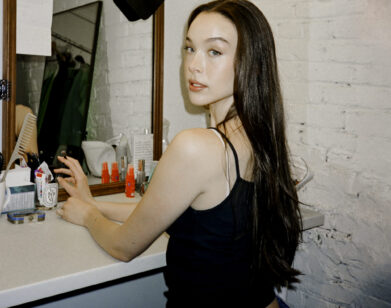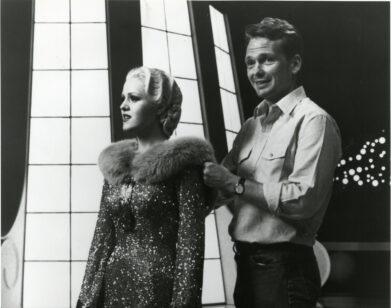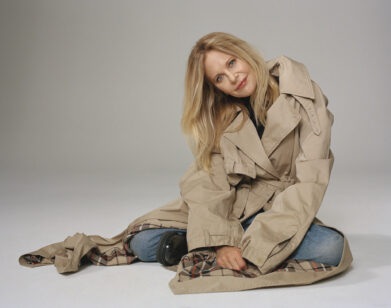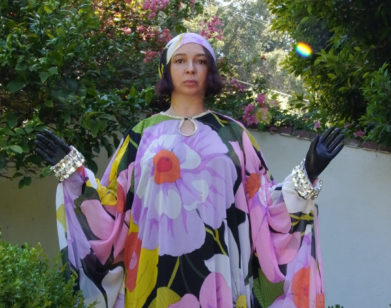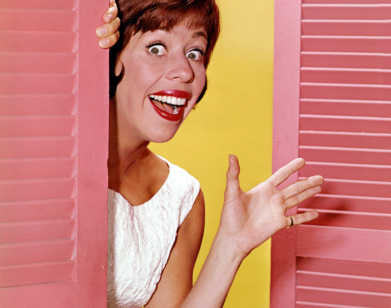BACKSTAGE
In Her One-Woman Show, Laura Benanti Bids Farewell to Her Inner-Ingénue
In her dressing room at the Minetta Lane Theater, the actor Laura Benanti is still making changes to her rollicking one-woman show Nobody Cares, even though it’s already six performances in to her 18-show run. The reason, I discover, is that her hard-nosed daughter Ella has some edits. Benanti had intended to run every joke by her seven-year-old, she explains, but one slipped through the cracks. “I didn’t think it would bother her because it’s actually not really about her,” she tells me. “And she was like, ‘You didn’t ask me if you could say that.'” But motherhood, and Benanti’s wrenching experience with postpartum depression, makes up only part of this show, which has the defiant, propulsive energy of a manifesto and a referendum. This time around, Benanti, a four-time Tony Awards nominee who won Best Featured Actress in a Musical for her star-making turn as Louise in the 2008 revival of Gypsy, isn’t delivering words and songs written by someone else. In Nobody Cares, which slithers between monologue and song with a certain madcap elegance, Benanti shows herself to be not just a consummate performer but a formidable humorist and observer of human behavior, taking aim at an industry that conditioned her, from a young age, to be pretty and pleasant and agreeable. It is, in effect, a joyous exorcism for the people-pleaser within, sprinkled throughout with sharp jokes about and reflections on divorce, breastfeeding, working in entertainment, and filming sex scenes. In this week’s installment of Backstage, Benanti talked to me about avoiding reviews, her comedic inspirations, and how her one-woman show, which runs through June 2nd, came together.
———
JAKE NEVINS: How’s it going?
LAURA BENANTI: It’s going great.
NEVINS: I had the pleasure of seeing the show last Thursday night with a dear friend of mine who’s going through a divorce and we were just laughing uproariously.
BENANTI: Yay. Thank you.
NEVINS: How does it feel to be back on stage?
BENANTI: It feels great. I feel like, “Okay, now I have more time with it.” I mean, to do a show like this for only three days is like being shot out of a cannon. Now, I know what worked and didn’t work. So getting to come back for 18 shows is very exciting and very fun. I feel like I’m going to learn a lot. With every show, I learn where the audience is with me.
NEVINS: You’re what, five or six shows in now? What have you learned so far?
BENANTI: Yeah, I’ve done six shows. There was a little section where I’m talking about the cool man-boy that I dated where I sort of go on a little tangent about his friends and how they were blind to me because my vagina was spoken for. It’s just not playing. So I’m like, “Okay, I can cut that.” There’s one moment that I’m actually in the process of trying to rework right now because last night my husband and I were discussing the show and my daughter Ella heard us talking about a joke that I had not run by her.
NEVINS: Oh. Well, I liked that moment.
BENANTI: Thank you. I didn’t think it would bother her because it’s actually not really about her. And she was like, “You didn’t ask me if you could say that.” I had asked her if I could tell every other story and I performed them and she was like, “Yes, that’s fine.”
NEVINS: She’s the showrunner.
BENANTI: Yeah. But I really do want to ask. The fact that I hadn’t run it by her upset her more than the thing she was talking about, which is very innocuous. But now I’m in the process of figuring out how to take it out because that matters more to me.
NEVINS: That makes sense. So I’m curious, since you’ve had such a successful career playing characters so different from yourself, if there’s a certain catharsis to writing and performing a show, as yourself, that’s entirely autobiographical.
BENANTI: Yes. That’s such a good question and I love the framing. It’s funny, because I had a sort of crisis as I was writing it and rehearsing it in the rehearsal room, even though no one was laughing because everybody knew the jokes. The first time I did it in front of an audience, I was like, “Oh, this is actually extremely vulnerable. And even though I’m making jokes, frankly at my own expense, these things were incredibly difficult.” Breaking my neck, getting divorced two times, having very severe postpartum depression and anxiety, not having friends until I was 30 years old. I didn’t realize that it would be challenging to talk about these things because I was doing it and getting laughs. So it wasn’t until the final show that I felt like I came onto stage as the woman I talk about at the end. But I feel like I came on stage as the girl.
NEVINS: That’s so interesting because there is a sense of completeness to the show. I didn’t quite know where you were going to end up, but I always got the sense, maybe because of the retrospective tone of the show, that you were speaking as the self-possessed woman we meet at the end, as opposed to a narrator who’s suffering in the moment.
BENANTI: I’m very happy to hear you say that. It makes me emotional, which made me feel embarrassed in the first iteration of the show. I didn’t want people to be like, “She’s acting.” I was just trying with all my might not to feel emotional about it. And this time, I feel like I can’t stop it. I’ve tried. But there is a true catharsis in being able to say these things out loud, and in hearing the audience’s response. When I say something challenging about giving birth or breastfeeding, so many women go “Mm-hmm.” There are a lot of, “Oh, yeahs.”
NEVINS: That sigh of recognition.
BENANTI: Yes, especially on Mother’s Day, when I talk about how motherhood is the sole vocation where people feel emboldened to walk up to a complete stranger and be like, “You’re doing it wrong.” One woman literally yelled, “Yes!” And that’s why I wrote this fucking thing.
NEVINS: That’s a good interruption. You don’t need to go Patti Lupone on her ass.
BENANTI: No, oh no. Please.
NEVINS: As you were experiencing many of the things you talk about in the show, could you have imagined one day telling jokes about them?
BENANTI: No. I mean, they were all the worst things that ever happened to me. And I’m sure some more shit’s gonna happen because that is the trajectory of our lives. But in writing the show, I realized how much life I have lived in 44 years. I even had some stuff in the show about miscarriages but I took it out, ‘cause there was just no coming back from it. It was just a cul-de-sac of pain.
NEVINS: That’s great. I mean, the turn of phrase, not the pain.
BENANTI: Well, thank you. That’s going to be my next show: “The Cul-de-sac of Pain.”
NEVINS: You also have some great insights about chronic people-pleasing, a syndrome I suffer from too. So I wanted to ask, do you see that as a function of this crazy industry you’ve been in for nearly 30 years? Or do you have a particular predisposition to it?
BENANTI: That’s such a good question. So, while I do believe that my people-pleasing and need to be liked was a predisposition, I do sometimes wonder if I would’ve grown out of it sooner had I chosen a different profession. I definitely was born a sensitive soul, as is my daughter.
NEVINS: Right. She’s got edits.
BENANTI: Exactly. But I do feel like in an industry that judges you on the way that you look, you constantly have outside feedback =, whether it’s good or bad. And whether it’s good or bad, it makes you self-conscious. Like reviews, the good ones are never good enough and the bad ones devastate you, and then you carry that around. I mean, people will walk up to me and be like, “You’re so much prettier in person.” Or, “Wow, you look older on TV.” With shit like that, I’m like, “What part of being a performer lends itself to people feeling like they own a little piece of you?” But if you are a sensitive person like me, it can lead to even more seeking of external validation. It’s sort of the foundation upon which at least this part of our industry is built.
NEVINS: It’s wild. The industry kind of conditions you to replace your own eyes with those of others, at which point the game is already lost.
BENANTI: That’s a beautiful way to put it.
NEVINS: Do you read reviews nowadays?
BENANTI: I want to say no, but that’s a lie. Sometimes my husband will read me a part of a review that he thinks won’t make me self-conscious.
NEVINS: But wouldn’t you then say, “Oh, what else did they say?”
BENANTI: No, I’m actually really proud of myself. He was like, “Oh, there were a couple of good reviews in some smaller publications.” And I was like, “I don’t want to know that. Please don’t tell me that.” I think because it’s me writing it, it feels more vulnerable, because if they don’t like this, then they just don’t like me. I’m not playing a character in somebody else’s show.
NEVINS: On that score, the one-woman show is a form with a particularly rich tradition. Were there any in particular that provided inspiration for Nobody Cares?
BENANTI: It’s Carol Burnett for me. She makes fun of herself. She’s sort of entirely without vanity. Amy Poehler, there’s a joy to her. She never punches down, which is my goal as well. Tina Fey, too. I had a joke in the show last time that I cut this time. I was like, “This just feels a little mean.” And I don’t want that. I want jokes at my expense, but I don’t ever want to get laughs from somebody else’s pain or discomfort.
NEVINS: Does that feel cheaper?
BENANTI: To me, it feels cheap. And it’s not hard to be a bully. That’s the easiest laugh in middle school, to make fun of somebody else. It’s not for me.
NEVINS: It’s interesting to me that those women you named, though they’re all multi-hyphenates in the truest sense, are thought of as women in comedy as opposed to theater.
BENANTI: Well, Julie Andrews too. I wanted to be Julie Andrews my whole life. She and Carol Burnett had such an amazing way of being together. But I think something I realized from starting so young in this business is that I want to have more say in my story than speaking somebody else’s lines. I want more agency. And what those women have is agency.
NEVINS: Well, there’s no better engine for that than your own, self-written show.
BENANTI: Thank you.
NEVINS: You pointed out the way people respond or the way people bring up a good review versus a bad review, which reminds me a lot of the moment in the show when you point out the differences in people’s reactions upon hearing about your first divorce versus your second. You really do have this sharp, almost sociologist’s eye for those kinds of things. Did that develop from feeling like an outsider for so long?
BENANTI: I mean, to credit dissociation, my default setting to pick myself up out of uncomfortable situations as a child was observation. So it’s like, I would come out of my body and be like, “You’re being made fun of right now.” And while it still deeply, deeply hurt me, it’s like I was able to observe it from the outside. I think if I didn’t have that mechanism, I would just be just a raw nerve constantly. But also, distance is helpful. I’m able to look back and reflect on these painful things because I have some distance from them and have come through and to a better place.
NEVINS: Well, that’s a good note to end on. This was such a pleasure.
BENANTI: Oh my gosh, I’ve loved talking to you.



